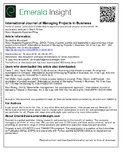Forms of power, politics and leadership in asynchronous virtual project environment: An exploratory analysis in South Africa

View/
Date
2013Author
Muganda, Nixon O
Pillay, Kiyashen
Language
enMetadata
Show full item recordAbstract
Purpose
– The paper aims to investigate the forms of power, politics and leadership exercised by project leaders within asynchronous virtual project environments (VPEs). The purpose of this paper is to link effective project leadership to particular forms of power and politics within a VPE.
Design/methodology/approach
– The empirical data are based on a quantitative telecommunications sector case study, complemented with some interviews, following a semi‐structured approach. The research was approached based from a positivistic philosophical paradigm and using a survey research strategy. The questionnaire‐based survey consisted of a sample of 28 respondents split between project managers (39.3 percent) and team members (60.7 percent).
Findings
– The research results indicated a significant finding which linked leadership effectiveness to asynchronous VPE usage and communication. Factor analysis of the type of leadership exercised within an asynchronous VPE revealed two forms of effective leadership. The first one, named, Structured Charismatic Exchange, is underpinned by three forms of leadership styles: charismatic, virtual and transactional leadership. The second insight from the factor analysis also revealed significant loadings for two forms of leadership: Participative and Shared leadership. The common strand in both is the need to elevate the ethos of teams, which effectively implies that control in VPE ought to be decentralized responsibly to enhance sharing. This is possibly relevant in a bid to minimize conflicts and thus develop a project organization that encourages teamwork. Therefore, this factor was named Decentralized Team Leadership. Unlike the first factor, where the focus is on how the project leader projects his/her personality to influence people, the realization is that for a project organization to succeed, project goals and decisions emerge from bargaining, negotiating, and jockeying for position among members of different coalitions.
Research limitations/implications
– Reported limitations are based on the sample size, effect of sectoral culture on the findings and constrained view of the virtuality construct. Future research should investigate other sectors with a large sample and expand the dimensions of the virtuality as a construct.
Practical implications
– The paper concludes that project leaders should re‐orient leadership practices to fit virtual project environments, taking into account the need for a more decentralized form of leadership and systematic trust building.
Originality/value
– The recognition of the uniqueness of particular forms of power and politics relevant for the exercise of effective leadership in asynchronous virtual environments is emphasized in this research paper.
URI
http://www.emeraldinsight.com/doi/full/10.1108/IJMPB-11-2011-0075http://hdl.handle.net/11295/84839
